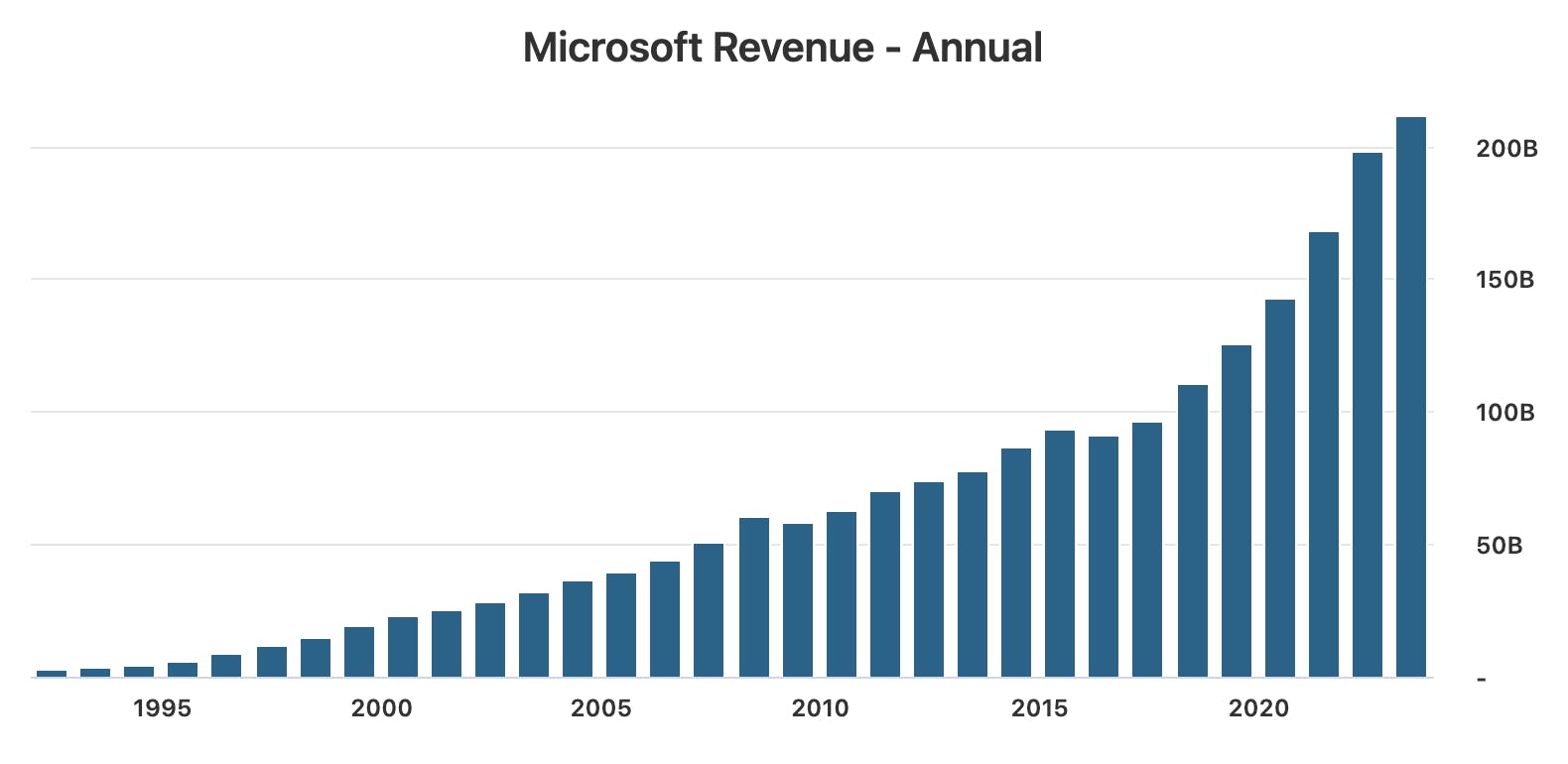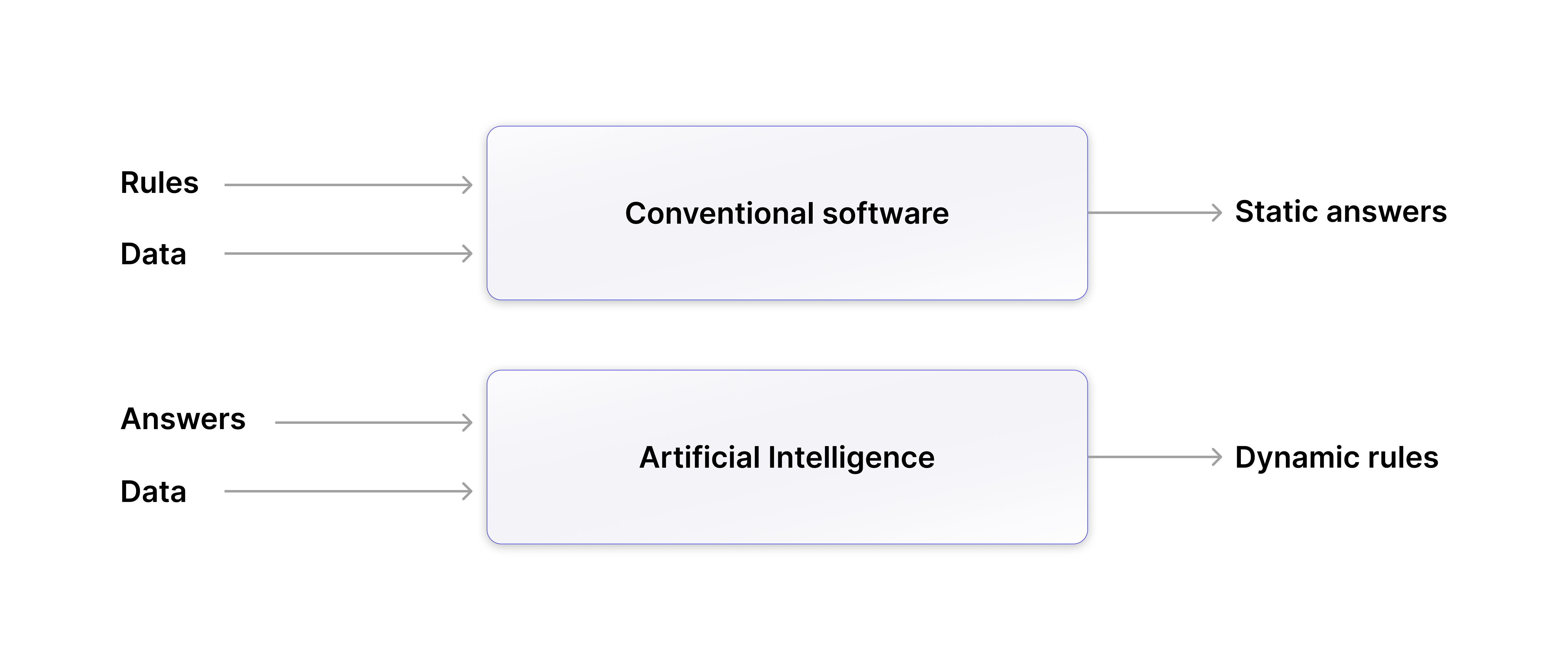Announcing our Series C with $110M in total funding. Read more →.
Contents
The Coming of the AI Revolution
Who Wins: Titans, Challengers, or Innovators?
Why This Time is Different
Encord Blog
Why AI Is the Mother of All Unicorns

"Say you want to watch a movie. To choose, you'll want to know what movies others liked and, based on what you thought of other movies you've seen if this is a movie you'd like. You'll be able to browse that information. Then you select and get video on demand. Afterward, you can even share what you thought of the movie. But thinking of it only in terms of movies on demand trivializes the ultimate impact. The way we find information and make decisions will be changed. Think about how you find people with common interests, pick a doctor, and decide what book to read. Right now, reaching out to a broad range of people is hard. You are tied into the physical community near you. But in the new environment, because of how information is stored and accessed, that community will expand. This tool will be empowering, the infrastructure will be built quickly and the impact will be broad." - The Bill Gates Interview, Playboy Magazine, July 1994
Sound familiar? Asked what else the personal computer was supposed to do other than process documents, Bill Gates prophesied the changes brought about by the coming of the information age that modern-day tech giants have since realized. From video-on-demand and movie recommendations (Netflix) to the way we find information (Google) to how you find people with common interests (Facebook) and deciding what book to read (Amazon 1.0), Gates' vision of the transformation that the information age would bring about turned out in more ways than one could conceivably imagine at the dawn of the Internet revolution.
The Coming of the AI Revolution
Fast forward 20 years, the AI revolution has begun. It will fundamentally transform our world, much just like the advent of the atomic bomb, microprocessor, personal computer, and the Internet. If the wealth generated from the emergence of each of these technologies offers any indication, we are poised to witness an unprecedented accumulation of wealth.

As with any prophesied significant platform shift, there's a real risk that they fail to materialize in a big way at a particular moment in time (e.g. Web3, Blockchain, Crypto, Metaverse) or that they take much longer than anticipated to play out (admittedly, crypto can still find an actual use case). Until as recently as ten years ago, almost all AI systems failed to demonstrate significant value, and many still do not (e.g., purely logic-based AI systems and symbolic AI - the dominant paradigm from the 1950s to the mid-1990s - are still primarily research interests).
We could be in for another AI hype cycle that may eventually fizzle. As an eternal optimist and founder of an AI company looking to raise a Series B in the not-too-distant future, I won't bother spelling out why AI is overrated. Instead, I'll argue why it will change the world.
When I explain AI to my parents, I describe it as a new form of dynamic software built on answers, unlike traditional status software built on rules. Put simply, comparing AI to conventional software is like saying "show" instead of "tell."

What's exciting about AI is that dynamic and answer-based software will enable us to create new products, applications, and systems that can solve unsolved problems that, until now, have been reserved for human cognition. Self-driving cars are the most obvious example - while traditional software can handle simple tasks like driving straight, building a fully autonomous vehicle would require an overwhelming number of static rules to cover even the basics of navigation.
It is not a leap to believe that the total addressable market (TAM) of problems only solvable by human cognition is orders of magnitude higher than that of any of the problems for which we use traditional software. As AI can augment and - in some cases - replace humans, it can produce what I think of as "non-linear" productivity outcomes. Here are a few contrived examples across various vertical use cases to illustrate the potential non-linearity of AI systems:
- Building a faster car to reduce the amount of attention required to drive from A to B (linear) vs. self-driving vehicle (non-linear)
- More efficient organization of leads and tasks in a CRM system with a slightly better UI for salespeople (linear) vs. AI talking avatars that allow for infinite scaling of the salesperson (non-linear)
- Improved diagnostic equipment that provides more detailed images for radiologists to analyze (linear) vs. AI-driven systems that scan medical images and highlight potential anomalies for doctors or even predict possible illnesses before symptoms manifest based on health data (non-linear)
- Better tractors and machinery to help farmers plant and harvest crops (linear) vs. drones and robots that monitor the health of individual plants, apply precise amounts of fertilizer or pesticide, and harvest crops with minimal human intervention (non-linear)
- A digital learning and education platform with improved video lectures and homework targeted specifically at programming (linear) vs. an adaptive chatbot that can be prompted to "explain this concept like I'm 12 years old" (non-linear)
The digital learning example is interesting as it is playing out in real-time: Chegg, the education technology company, saw its stock price tumble 47% (down ~63% year-to-date) after admitting that ChatGPT was pressuring its subscriber growth, leading them to suspend their full-year outlook. You get the idea.
Just as the Internet's value skyrocketed with evolving applications, tools, and increased user participation, so too will the AI sector's worth. Despite the Internet's basic components remaining similar to those of the early 1990s, its value has grown exponentially over 20 years due to expanded applications and user engagement. As more individuals and businesses embrace AI and develop applications, the supporting tools and infrastructure will improve. Increased data availability will also enhance product quality. This cyclical improvement will fuel exponential growth in AI.
Undoubtedly, AI is poised to be the next major technological platform shift within the next 20 years. While previous technological revolutions, like the Internet or the Industrial Revolution, were monumental in reshaping societies and economies, AI encapsulates something far more profound: the essence of human cognition. The wealth generation from novel solutions to previously unsolvable problems, combined with the heightened productivity and efficiency across all sectors, implies that the economic impact of AI could dwarf that of all prior technological shifts. The emergence of AI will give birth to an unfathomable number of unicorns.
Who Wins: Titans, Challengers, or Innovators?
Ok, so AI will be huge, but who wins the biggest slice of the pie, and where will the most value be generated? While the Twitter VC community may have its own predictions, here are my thoughts on a potential outcome. I could of course be entirely wrong.
Early winners like NVIDIA have already experienced a surge in their stock price, and investors believe that generative AI and LLM developers will be the next big thing, as evidenced by the high valuations and significant investment flowing into those companies. The landscape is already fiercely competitive, especially among "neo" foundation model/LLM providers (e.g., Cohere, Anthropic, Mistral).
Given the high valuations and evolving competitive landscape, I question the viability of venture-scale returns for most of these new entrants. There is a limit to how many chatbots the market can absorb, after all. Additionally, OpenAI is also so far ahead (8 years of R&D and billions of queries via ChatGPT generating valuable RLHF data) that it will be difficult for any of these companies to catch up. Perhaps one or two will succeed, but for emerging LLM companies to truly thrive, they will likely need to uncover unique niches or pivot towards refining larger models using specialized, proprietary datasets for distinct needs and/or partnering with downstream application developers. Some corporate/venture combinations could also happen, where partnerships like OpenAI/MSFT, Anthropic/Google, and Cohere/Meta-type will combine distribution and data advantage with R&D expertise. Elad Gil made some interesting observations on this here.
Separately, foundation model providers will likely realize lower margins in the first few years of operation, as they more closely resemble 'hardware-type companies' with significant upfront training expenses. However, this does not mean that developers who create applications using these large models won't achieve considerable margins even if the TAM of those markets is much smaller, for example, by offering specialized expertise, products, and other value-added services related to these models. Jasper is an example of a company that has done this perfectly - they've built a product that serves marketers, and just marketers, well.
All things considered, the AI market will probably resemble that of the current software market in 20 years. There will be a few huge "Big AI" companies with over $100 billion in revenue (this could very well end up being the foundation model developers, but it could also be companies that we haven't even conceived of yet) and a diaspora of large companies focusing on specific applications (e.g., Stripe for payments, Uber for transportation, Figma for design - this could be Jasper for marketers, Cruise for autonomous vehicles, Viz AI for medical imagery, and so on). For context, Apple, Microsoft, Amazon, Meta, and Alphabet constitute ~$9 trillion of the value of the NASDAQ's ~$22 trillion market cap. This is a substantial chunk, no doubt, but the total size of the pie is undoubtedly only going to get bigger as the AI market gets underway and secular trends in technology continue to reverberate.
Why This Time is Different
Technological revolutions often occur due to a convergence of pivotal factors, and the AI sector is currently experiencing such a juncture. Similar to the Internet's ascendance, which was enabled by ubiquitous personal computers and faster connectivity, the current AI boom is a product of simultaneous advances in computing power, vast data availability, and increasingly advanced models.
Eric and I founded Encord at a pivotal moment when object detection models transitioned from often being erroneous and requiring highly controlled "sandbox"-type environments to delivering tangible ROI. Similarly, the release of ChatGPT marked a paradigm shift in how we approached natural language processing and understanding.
Looking into the near future, I anticipate AI delving deeper into multi-modal applications, offering higher ROI and increasingly viable solutions to more complex problems, and even stepping into realms of human reasoning.
In short, the market is just getting started. The value, revenue, TAM, etc., will naturally accrue as the complexity of the problems that we solve with AI increases. After all, it was impossible to stream a movie over your Internet connection 20 years ago, but now its table stakes.
Explore the platform
Data infrastructure for multimodal AI
Explore product